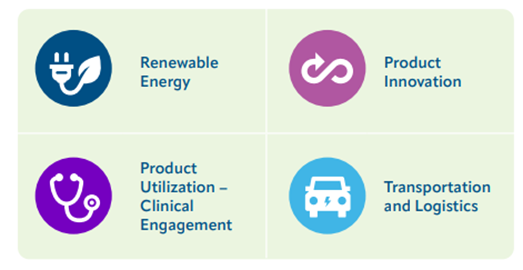Collaborative for Healthcare Action to Reduce MedTech Emissions (CHARME)

About CHARME
CHARME is an initiative convening health systems, medical device and equipment suppliers, distributors, GPOs, and other key industry stakeholders to define, implement, and champion best practices to reduce emissions from the MedTech supply chain. CHARME members will work collaboratively to implement actions along a 24-month decarbonization roadmap defined in the white paper Catalyzing Collective Action to Decarbonize Healthcare Roadmap for Health Systems and MedTech Suppliers, published in May 2023 with input from over 30 organizations.
CHARME is being convened to address a gap in current industry initiatives in addressing the supply chain for medical devices and supplies, which makes up 7% of the health sector’s US footprint. Collective action is needed to decarbonize at the pace and scale required, and working together will provide efficiencies and innovation no single company can achieve alone.
How CHARME Works
CHARME will be an action-oriented, 24-month initiative laser-focused on enabling collaborative efforts within the health value chain to achieve rapid progress toward industry and individual members’ decarbonization goals. CHARME members actively participate in at least one of the initiative’s workstreams to amplify the individual progress each member is making towards emissions reduction goals.
CHARME officially launched on April 9th 2024 and more participants are joining every day! If you weren't able to attend the Launch Webinar event, here's the recording where you can hear from program conveners and industry leaders about why this collaborative is so important:
Watch the CHARME Launch Recording
CHARME’s Focus for Impact
To mobilize collaboration and provide a roadmap for near-term efforts to decarbonize the MedTech value chain, key actions have been selected under four decarbonization levers:

To drive renewable energy sourcing, health systems and suppliers can pursue joint purchasing of renewable electricity through offsite Power Purchase Agreements (PPAs). PPAs are financial agreements where a solar developer designs, permits, and installs a solar energy system, then sells the power generated to a customer at a fixed rate typically lower than the local utility’s retail rate.
Health systems and MedTech suppliers can work together by aggregating their energy demand and buy renewable energy from a large-scale generation facility to create an aggregate PPA. Aggregate PPAs enable companies to achieve economies of scale, thus allowing smaller companies to participate. CHARME will provide a forum for interested companies to confirm and qualify aggregate VPPA interest, identify target energy markets, and develop the governance agreements necessary to support this joint initiative.
The carbon footprint of healthcare products is determined by product composition, packaging, and end-of-life. Embedded carbon in MedTech products contributes substantially to both health systems’ and suppliers’ Scope 3 emissions. Suppliers have been looking at ways to produce more sustainable products in response to customer demand for environmentally preferable products and to meet their own decarbonization goals. However, changing products can be particularly challenging because design and manufacturing changes may require significant upfront investment, longer timelines, and regulatory considerations.
Collaboration between health systems and MedTech suppliers creates a significant opportunity to focus on specific subsets or categories of products and identify best practices to decarbonize across the product lifecycle. CHARME will provide a forum for members to explore potential product or packaging categories where rapid innovation is feasible. Within those categories, CHARME members will identify specific decarbonization actions that can be explored to reduce embedded emissions.
Product utilization plays an important role in the emissions generated over the course of a product’s lifecycle. Clinicians and other clinical staff are not only key decision makers on the types of products being procured, but also determine where, when, how, and how much of products are being used. To enable adoption of sustainable products and practices, clinical staff need to be educated on the importance of using sustainable products, as well as their availability, safety, and efficacy.
To identify and activate decarbonization efforts through product utilization, CHARME will focus on three initiatives. CHARME will set up a forum to evaluate product durability opportunities to replace single-use devices with reprocessed or durable option while maintaining patient safety in different clinical environments. The collaborative will also educate clinicians on available product reprocessing and set up pilots for specific devices to increase adoption. Finally, CHARME will identify opportunities for surgical kit reformulation, targeting items that routinely go unused during procedures and remove them from surgical packs.
Efficient and timely logistics and delivery are vital for health systems to ensure availability of supplies for patient care and operations. However, the complexity of health system logistics, especially for critical, time-sensitive, or expensive products, frequently results in last minute orders and inefficient delivery and transportation, including less-than-truckload (LTL) deliveries. These situations negatively impact both health systems’ and suppliers’ carbon footprints and bottom lines.
Health systems and suppliers can work together to optimize ordering, packing, and delivery routes and frequency. They can also minimize less-than-truckload, overnight, and last-mile deliveries, while ensuring the availability of critical supplies. These changes can apply to supplies being delivered to medical facilities as well as those going to patient homes. CHARME will provide a forum for health systems and MedTech suppliers to identify potential transportation efficiencies in their operations and pursue strategies to address them.
CHARME Participant Requirements
CHARME is an action-oriented, 24-month initiative laser focused on enabling meaningful efforts with the health value chain. The shared work and outputs of CHARME will build on an amplify participating organizations’ progress towards emissions reduction goals. To ensure that CHARME enables these outcomes, participants are asked to meet the following requirements:
- Have a public greenhouse gas emissions reduction goal in place.
- Appoint a sustainability representative, a procurement representative, a clinical or product representative to participate in CHARME activities as needed, and a C-suite sponsor.
- Participate in at least one CHARME workstream.
- Attend at least 75% of CHARME meetings.
The estimated organizational time commitment for a CHARME participant is 4-6 hours per month.
Thanks to the organizations that have provided seed funding for this project.
 |
 |
CHARME is facilitated by:

The SPLC is proud to serve as CHARME's administrative organization, bringing key sustainable procurement expertise with a proven track record of building coalitions and supporting organizations as they design and execute meaningful sustainable procurement strategies.
